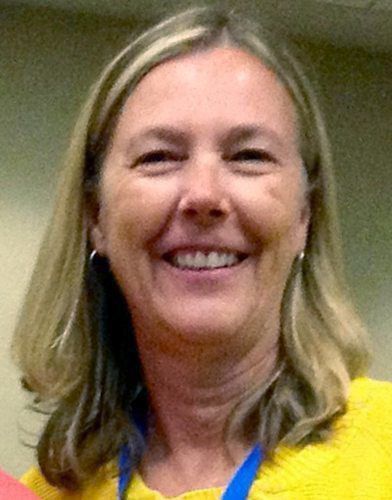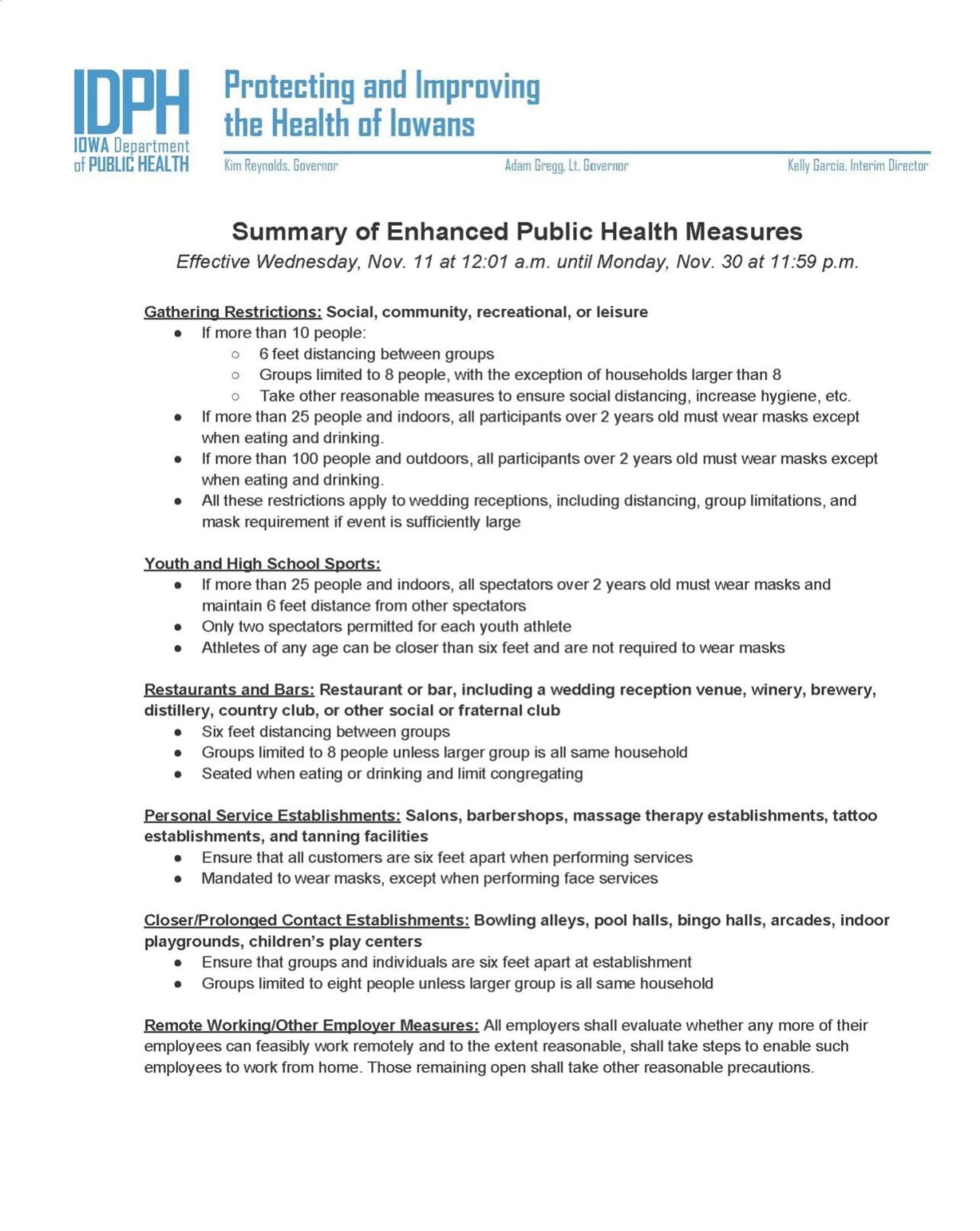Iowa Gov. Kim Reynolds on Tuesday announced that, due to soaring numbers of hospitalizations related to COVID-19, she was implementing a new wave of mitigation measures.
“I’m here to tell Iowans I need your help,” she said. “If you want to keep our businesses open, if you want to keep our kids in school, if you want to make sure we have hospitals and long-term-care facilities and we have clinics that can treat not only COVID patients but can treat other individuals that have serious health conditions that need to go to the hospital, then we all have to buckle down and take this serious.”
The seven-day rolling average of the positivity rate in Iowa has risen over the past two weeks to over 48%, according to researchers at Johns Hopkins University. The state’s rate is second only to South Dakota. The Iowa Department of Public Health reported 3,900 new confirmed cases from 5 p.m. Monday to 5 p.m. Tuesday, and there were 24 additional related deaths during that time, raising the state total to 1,874.
Reynolds announced a suite of new restrictions “targeted to where we’re seeing that spread.” Namely, she said those include gatherings of family and friends, such as weddings and youth athletics.
Effective today, social gatherings of 25 or more people indoors and of 100 or more outdoors are prohibited unless everyone older than 2 wears face coverings and is socially distanced. Reynolds said specifically that this applies to Thanksgiving holiday gatherings.
The governor continued the requirement of 6 feet of distance between groups in bars and restaurants and limited groups to eight people unless they’re all members of the same household. She said the new rules don’t apply to school districts — nearly all of which already have the option of shifting to online-only learning because of the high positivity rate throughout the state.
Face coverings also will now be required in salons, barbershops, tattoo parlors, massage therapy establishments, tanning parlors and “other establishments providing personal services.”
“Bowling alleys, pool halls, bingo halls, arcades, indoor playgrounds and children’s play centers are now required to ensure that groups and individuals remain 6 feet apart at the establishment,” states a press release.
Asked why she didn’t impose a mask requirement for smaller gatherings, Reynolds said: “It’s a place to start, and it’s progress from where we were.”
When asked if it would be better to limit capacity in bars and restaurants, as she did in August, Reynolds said she needed to balance “the health of Iowans and their livelihoods.”
Reynolds also added restrictions for youth and high school athletics events.
“I can’t have a gym packed with people and risk them not wearing masks,” she said.
So, attendance at indoor sporting events will be limited to two spectators per participant.
“People are becoming relaxed because we’ve been dealing with it for so long,” Reynolds said.
Kevin Kotz, general manager of Dubuque County Fairgrounds, said staff there will need to examine the proclamation further and re-evaluate its planned events but emphasized that he believes at least some scheduled weddings still could occur.
“We all figured it was coming, and we’re in contact with our brides for the upcoming weddings,” he said. “We will see how all other events go, and we will enforce the rules.”
The fairgrounds later announced on its Facebook page that masks will be required for upcoming events.
Toby Kress, manager of Hillside Events Center in Peosta, said his business is mostly debt-free and can weather the impact the proclamation will have on planned events, but he fears for other venues.
“It’s going to cause a lot of bankruptcies,” Kress said. “A lot of these businesses were barely making it before, and this is only going to make it harder for them.”
Keri Knipper, the owner of Uptown Hair salon in Dyersville, said the mask requirement makes it more challenging for her and her staff to blow-dry hair or perform precise cutting. She added that some customers aren’t inclined to receive haircuts if they are required to wear a mask.
“Some people do get frustrated over that,” Knipper said. “It’s not comfortable, and it can get hot for the client.”
Patrice Lambert, director of the Dubuque County Health Department, said the measures taken by the governor are a step in the right direction.
“It’s a good start,” Lambert said. “She is addressing things like face coverings and large gatherings, which needed to be addressed.”
However, the measures won’t entirely prevent the spread of COVID-19, Lambert said. She stressed that residents need to take measures themselves if they are to curb the proliferation of the virus.
“I can’t say enough that we can’t let our guard down,” Lambert said. “We need people to abide by these guidelines along with all of the new mitigation strategies.”
Senate Democratic Leader Janet Petersen said Reynolds’ actions are like buying a smoke detector after your house is blazing out of control. House Democratic Leader Todd Prichard said the governor’s response is too little and too late.
“After ignoring the pandemic and public health guidelines for a month while campaigning, Gov. Reynolds has put the State of Iowa in a crisis today,” he said.
Separately the Iowa Supreme Court issued an order postponing jury trials until Feb. 1, unless the jury is sworn in by Nov. 16. Clerk of court offices remain open and non-jury trials and face-to-face court proceedings and services will continue. Chief Justice Susan Christensen said holding jury trials now “creates too high of a risk for someone to be exposed, even with the multitude of safeguards we have in place.”




